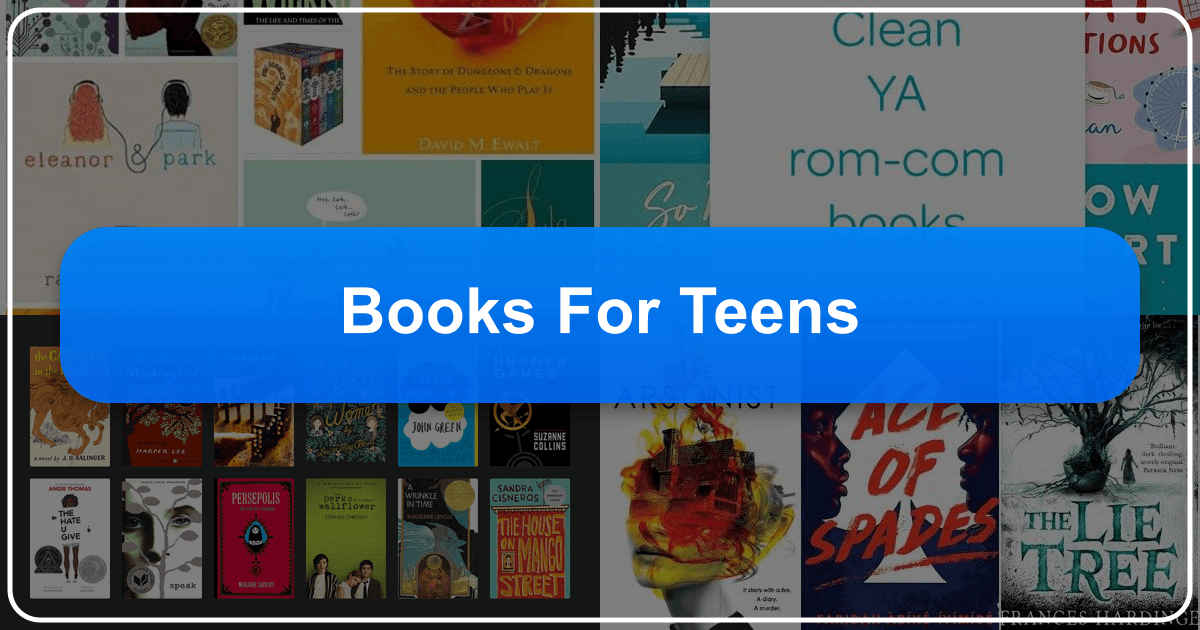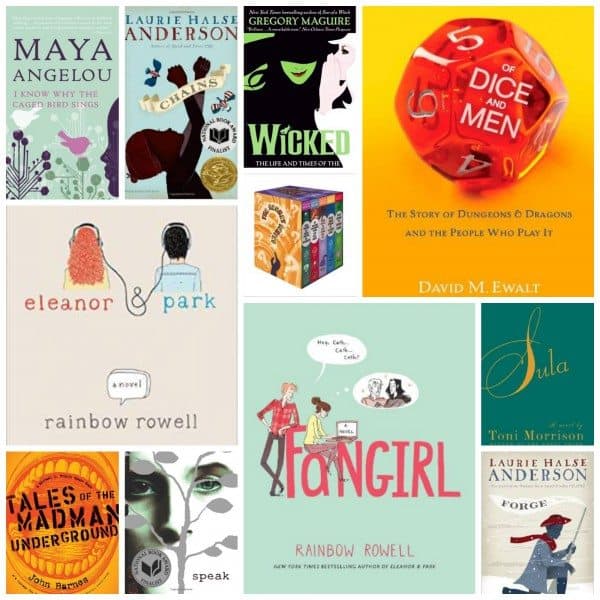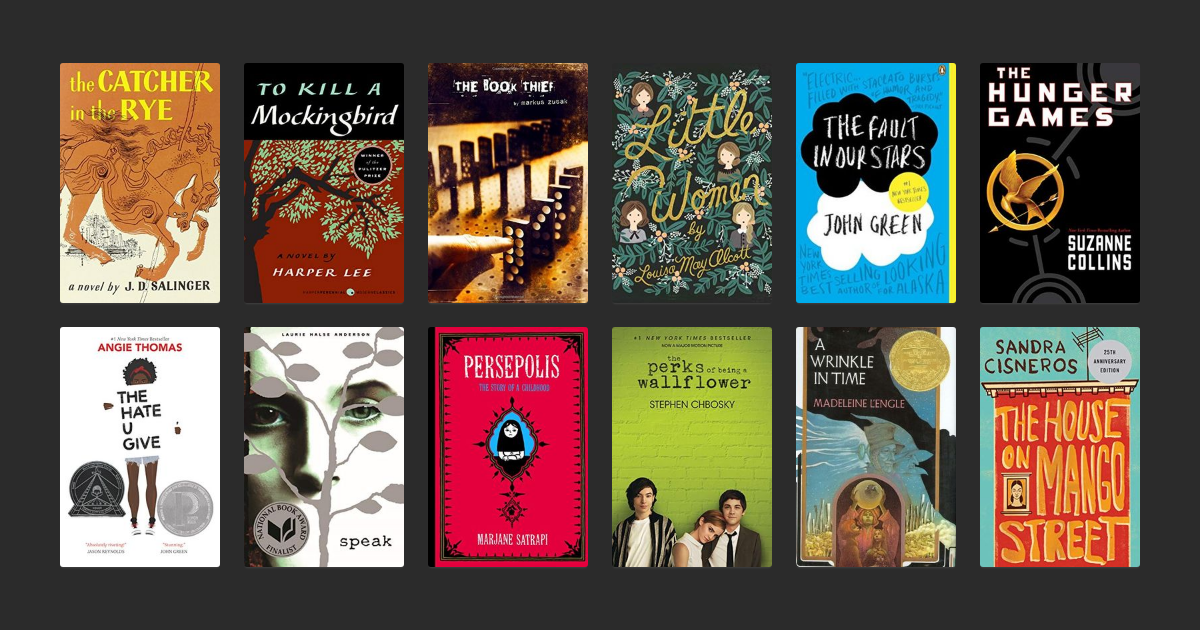Books for Teens: A Comprehensive Guide to Engaging Young Adult Literature

Choosing the right books for teenagers can be a challenging yet rewarding experience. This guide delves into the diverse world of young adult (YA) literature, offering a curated selection of titles, exploring various genres, and highlighting the broader cultural impact of reading. We’ll examine the importance of reading for teens, suggest ways to cultivate reading habits, and provide resources to discover more engaging books.
Understanding the Teenage Reader
The teenage years are a period of significant personal growth, marked by the exploration of identity, relationships, and the world at large. Books offer a unique window into these experiences, providing relatable characters, thought-provoking narratives, and opportunities for self-reflection. A key to success in encouraging teen reading is to understand their individual preferences and interests. Some teens gravitate towards fast-paced thrillers, while others prefer introspective character studies or fantastical adventures. Acknowledging this diversity is crucial in selecting books that will resonate with each individual teen.
Choosing books that align with a teen’s current interests is paramount. If they are passionate about a particular subject, such as history, science, or sports, selecting books that explore these themes can greatly increase their engagement with the material. Similarly, if a teen enjoys a particular genre, such as science fiction, fantasy, or romance, providing them with access to relevant books can help to solidify their reading habits. The availability of books in various formats, including physical books, ebooks, and audiobooks, can also significantly impact a teen’s enjoyment of reading. This flexibility allows teens to choose a format that best suits their needs and preferences, making the process of reading both convenient and enjoyable.

Beyond personal interests, books offer a vast array of educational and developmental benefits for teenagers. Reading helps expand vocabulary, improve comprehension skills, and enhance critical thinking abilities. It can also broaden a teen’s understanding of different cultures and perspectives, fostering empathy and tolerance. Exposure to diverse characters and storylines can challenge preconceived notions and promote inclusivity, a critical aspect of development during adolescence.

Furthermore, many YA books tackle complex issues that are relevant to teenagers’ lives, such as identity, mental health, social pressures, and relationships. These books can provide a safe space for teens to explore these themes, helping them process their own experiences and gain a greater sense of self-understanding. Reading about characters who navigate similar challenges can offer reassurance, support, and a sense of community.
Genres and Themes in Young Adult Literature

The landscape of YA literature is incredibly diverse, encompassing numerous genres and subgenres, each offering something unique to teen readers.
Mystery and Thriller
This genre often features compelling plots, unexpected twists, and suspenseful narratives that keep readers engaged from beginning to end. Books in this category often explore themes of justice, deception, and the search for truth, providing teens with opportunities to develop their critical thinking skills and analyze complex situations. Examples of popular mystery and thriller books for teens include:
- “A Good Girl’s Guide to Murder” by Holly Jackson: This gripping mystery follows Pip, a high school student who decides to investigate a cold case.
- “One of Us is Lying” by Karen McManus: This suspenseful novel revolves around five students, one of whom dies mysteriously, leaving everyone to wonder who committed the crime.
- “Truly Devious” series by Maureen Johnson: A series of mysteries set in a prestigious boarding school, blending classic whodunits with suspense.
Science Fiction and Fantasy
These genres offer escapism and the exploration of imaginative worlds, often with themes of good versus evil, self-discovery, and the power of friendship. Many popular science fiction and fantasy books incorporate elements of social commentary and explore broader philosophical questions, prompting teens to think critically about the world around them and consider different perspectives. Notable examples:
- “The Hunger Games” series by Suzanne Collins: A dystopian series exploring themes of survival, rebellion, and power.
- “The Lunar Chronicles” by Marissa Meyer: This series reimagines classic fairy tales within a science fiction setting.
- “Shadow and Bone” series by Leigh Bardugo: A fantasy series set in a world of magic and intrigue, with compelling characters and a captivating plot.
Contemporary and Realistic Fiction
These books offer relatable characters and storylines that explore the everyday challenges and triumphs of teenage life. They often grapple with significant social issues, such as racism, bullying, mental illness, and LGBTQ+ issues. These narratives provide teens with opportunities to develop empathy and gain a deeper understanding of social injustices. Popular choices include:
- “The Hate U Give” by Angie Thomas: This powerful novel tackles issues of race, police brutality, and social injustice.
- “Aristotle and Dante Discover the Secrets of the Universe” by Benjamin Alire Saenz: A coming-of-age story that explores themes of friendship, love, and self-discovery.
- “I Am Not Your Perfect Mexican Daughter” by Erika L. Sánchez: This book deals with family dynamics, cultural identity, and grief.
Romance
Teen romance novels often focus on the emotional complexities of first love, heartbreak, and navigating relationships. While some may focus on lighthearted and fun narratives, others explore deeper issues such as consent, communication, and the importance of healthy relationships.
- “The Summer I Turned Pretty” series by Jenny Han: A popular series that follows the summer romance of two teenagers.
- “To All the Boys I’ve Loved Before” by Jenny Han: This sweet and charming novel follows a teenage girl who must confront her past.
- “Love, Simon” by Becky Albertalli: A coming-of-age story about a gay teenager who must navigate his identity and relationships.
Graphic Novels
Graphic novels offer a unique blend of visuals and storytelling, making them highly accessible to reluctant readers. This format can be particularly effective in engaging teens who prefer visual media or may find traditional novels intimidating. Many graphic novels explore a wide range of themes and genres, just as traditional books do.
- “Persepolis” by Marjane Satrapi: This autobiographical graphic novel explores growing up during the Iranian Revolution.
- “American Born Chinese” by Gene Luen Yang: A poignant graphic novel addressing issues of identity and belonging.
- “Fun Home” by Alison Bechdel: A unique memoir in graphic novel format exploring family dynamics.
Cultivating Reading Habits in Teens
Encouraging a love of reading in teenagers requires a multifaceted approach. It’s not merely about assigning books but fostering a positive and enjoyable reading experience.
Creating a Supportive Environment
Designate a quiet and comfortable space for reading, free from distractions. Ensure access to a diverse collection of books tailored to the teen’s interests. Regular visits to the library or bookstore can provide new opportunities for discovery.
Engaging with Books Together
Discuss books with your teen, sharing your own reading experiences, and encouraging them to articulate their thoughts and feelings. This can be a valuable opportunity for bonding and understanding their perspectives.
Utilizing Technology
Explore online resources and apps designed to help teens discover new books. Many libraries offer e-book and audiobook services, broadening access to a wider range of titles.
Making it Fun
Organize book clubs, reading challenges, or themed reading events. Involve friends or other family members in the process to make reading a more social and interactive experience.
Leading by Example
Reading yourself is a powerful demonstration of the joy of reading. Let your teen see you enjoy reading and discuss books enthusiastically.
The Cultural Impact of Young Adult Literature
Young adult literature plays a significant role in shaping cultural conversations. Many YA novels tackle important social issues, challenging norms and prompting discussions about gender, race, sexuality, and social justice. The popularity of these books has led to increased representation and inclusivity in literature, reflecting the diverse experiences of teenagers around the world. Many YA novels are adapted into films, TV series, and stage plays. These adaptations introduce the narratives and themes of the books to a broader audience, further amplifying their cultural impact. Award ceremonies and literary prizes for young adult literature recognize and celebrate the achievements of authors and illustrators. These awards provide recognition for creativity, quality writing, and important social contributions through literature. Online communities and social media groups dedicated to young adult literature provide platforms for teens to connect with one another, discuss their favourite books, and discover new authors. This sense of shared experience strengthens the cultural impact of YA literature.
By understanding the various aspects of teenage reading, encompassing genre preferences, educational benefits, and the broader societal influence of YA literature, we can better assist teens in discovering the power and pleasure of reading. The resources and suggestions outlined above provide a starting point for this journey, fostering a love of books that will last a lifetime.